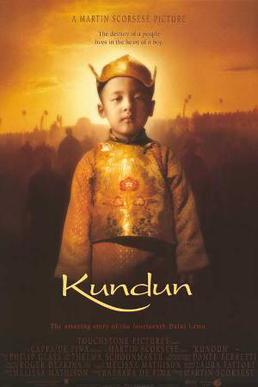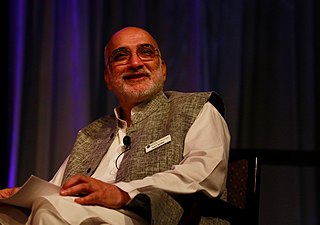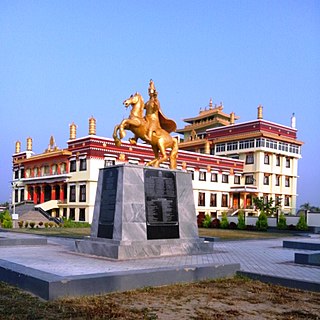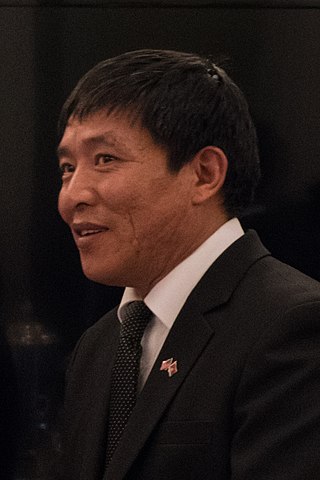
Kofi Atta Annan was a Ghanaian diplomat who served as the seventh secretary-general of the United Nations from 1997 to 2006. Annan and the UN were the co-recipients of the 2001 Nobel Peace Prize. He was the founder and chairman of the Kofi Annan Foundation, as well as chairman of The Elders, an international organisation founded by Nelson Mandela.
Worldview was WBEZ's weekdaily global issues talk radio show, hosted by Jerome McDonnell. The show featured long-form interviews about how race, ethnicity, gender, identity, the environment, religion, politics, and economics drive and shape the news. It also brought in experts to discuss international news from a local perspective, and draws local connections. The show heavily featured arts, activism, and social movements in Chicago.

Heidemarie Wieczorek-Zeul is a German politician and a member of the Social Democratic Party (SPD) since 1965.

Kundun is a 1997 American epic biographical film written by Melissa Mathison and directed by Martin Scorsese. It is based on the life and writings of Tenzin Gyatso, the 14th Dalai Lama, the exiled political and spiritual leader of Tibet. Tenzin Thuthob Tsarong, a grandnephew of the Dalai Lama, stars as the adult Dalai Lama, while Tencho Gyalpo, a niece of the Dalai Lama, appears as the Dalai Lama's mother.
The Dorje Shugden controversy is a controversy over Dorje Shugden, also known as Dolgyal, whom some consider to be one of several protectors of the Gelug school, the school of Tibetan Buddhism to which the Dalai Lamas belong. Dorje Shugden has become the symbolic focal point of a conflict over the "purity" of the Gelug school and the inclusion of non-Gelug teachings, especially Nyingma ones.

Elizabeth Farnsworth is a journalist, author, and filmmaker. She is a former foreign correspondent and former chief correspondent and principal substitute anchor of PBS NewsHour with Jim Lehrer. She has written two books, including a novella, Last Light, which was published by Flint Hills Publishing, and a memoir. Her 2008 documentary, The Judge and the General,, aired on television around the world, winning many awards. She has reported from Cambodia, Vietnam, Chile, Haiti, Iraq, and Iran, among other places. Having previously lived in Peru, Chile, Los Angeles, and Washington, D.C. for extended periods, she now lives in Berkeley, California.

Tenzin Ösel Hita y Torres is a Spanish Tibetan Buddhist tulku and spiritual teacher. Born Ösel Hita Torres to María Torres and Francisco Hita, he was designated soon after his birth as the tulku or reincarnation of Thubten Yeshe — making him one of only a handful of Western tulkus — and renamed Tenzin Ösel.

Rajiv Mehrotra is an Indian writer, television producer-director, documentary film maker, a personal student of the Dalai Lama for whom he manages as Trustee/Secretary The Foundation for Universal Responsibility established with the Nobel Peace Prize. He is best known as the former acclaimed host of one of India's longest running talk shows on public television, "In Conversation", that has been through several incarnations over more than twenty years, aired on the India's National broadcaster, Doordarshan News Channel, Saturdays at 9.30 pm.

Global Information Network, Ltd. or GIN, incorporated in 1986, is an independent, New York domestic non-profit news organization with an office in New York City that gathers and disseminates news from reporters in the field in Africa. It supplies news, analysis, and features to over 300 ethnic and minority newsweeklies nationwide. Its stories have appeared in print, broadcast and web media in the U.S.

The Elders is an international non-governmental organisation of public figures noted as senior statesmen, peace activists and human rights advocates, who were brought together by Nelson Mandela in 2007. They describe themselves as "independent global leaders working together for peace, justice, human rights and a sustainable planet". The goal Mandela set for The Elders was to use their "almost 1,000 years of collective experience" to work on solutions for seemingly insurmountable problems such as climate change, HIV/AIDS, and poverty, as well as to "use their political independence to help resolve some of the world's most intractable conflicts".
Breakthrough is a global human rights organization working to end violence against women and girls.

The 14th Dalai Lama is the incumbent Dalai Lama, the highest spiritual leader and head of Tibetan Buddhism. Before 1959, he served as both the resident spiritual and temporal leader of Tibet, and subsequently established and led the Tibetan government in exile represented by the Central Tibetan Administration in Dharamsala, India. The adherents of Tibetan Buddhism consider the Dalai Lama a living Bodhisattva, specifically an emanation of Avalokiteśvara or Chenrezig, the Bodhisattva of Compassion, a belief central to the Tibetan Buddhist tradition and the institution of the Dalai Lama. The Dalai Lama, whose name means Ocean of Wisdom, is known to Tibetans as Gyalwa Rinpoche, The Precious Jewel-like Buddha-Master, Kundun, The Presence, and Yizhin Norbu, The Wish-Fulfilling Gem. His devotees, as well as much of the Western world, often call him His Holiness the Dalai Lama, the style employed on his website. He is also the leader and a monk of the Gelug school, the newest school of Tibetan Buddhism, formally headed by the Ganden Tripa.

The Tibetan diaspora is the relocation of Tibetan people from Tibet, their country of origin, to other nation states to live as exiles and refugees in communities. The diaspora of Tibetan people began in the early 1950s, peaked after the 1959 Tibetan uprising, and continues.

Protests and uprisings against the government of the People's Republic of China have occurred in Tibet since 1950, and include the 1959 uprising, the 2008 uprising, and the subsequent self-immolation protests.

Dhondup Wangchen is a Tibetan filmmaker imprisoned by the Chinese government in 2008 on charges related to his documentary Leaving Fear Behind. Made with senior Tibetan monk Jigme Gyatso, the documentary consists of interviews with ordinary Tibetan people discussing the 14th Dalai Lama, the Chinese government, the 2008 Beijing Olympics, and Han Chinese migrants to the region. After smuggling the tapes of the interviews out of Tibet, however, Dhondup Wangchen and Jigme Gyatso were detained during the 2008 Tibetan unrest.
The Foundation for Universal Responsibility of His Holiness the Dalai Lama is a nonprofit organization established with the Nobel Peace Prize awarded to the 14th Dalai Lama in 1989. According to its website, "the Foundation brings together men and women of different faiths, professions and nationalities, through a range of initiatives and mutually sustaining collaborations."

Not My Life is a 2011 American independent documentary film about human trafficking and contemporary slavery. The film was written, produced, and directed by Robert Bilheimer, who had been asked to make the film by Antonio Maria Costa, executive director of the United Nations Office on Drugs and Crime. Bilheimer planned Not My Life as the second installment in a trilogy, the first being A Closer Walk and the third being the unproduced Take Me Home. The title Not My Life came from a June 2009 interview with Molly Melching, founder of Tostan, who said that many people deny the reality of contemporary slavery because it is an uncomfortable truth, saying, "No, this is not my life."

The Kofi Annan Foundation is an independent, not-for-profit organisation whose mission is to help build peaceful, democratic and resilient societies. It was founded and legally incorporated in Switzerland in 2007 by the late Kofi Annan, former secretary general of the United Nations.
Donald Leungo Gosego Molosi is an actor, writer and playwright from Botswana. Molosi debuted off-Broadway in 2010 as Philly Lutaaya in Today It's Me making him the first Motswana to perform off-Broadway. In 2011, Molosi won the Best Short Solo Award at United Solo Theatre Festival for his performance as Seretse Khama in Blue, Black and White. In 2013, Molosi returned off-Broadway to perform Motswana: Africa, Dream Again. He played supporting roles in the films A United Kingdom (2016) and Given (2009). As a playwright, Molosi has published a collection of his original off-Broadway plays, which include We Are All Blue, Blue, Black and White and Motswana: Africa, Dream Again in 2016.

The Millennium Peace Summit of Religious and Spiritual Leaders was held in New York City between August 28–31, 2000. The meeting recognized the importance of religion to world peace and faith leaders’ commitment to peacekeeping, poverty relief, and environmental conservation. It preceded the Millennium Summit, which commemorated the 50th anniversary of the United Nations (UN).















